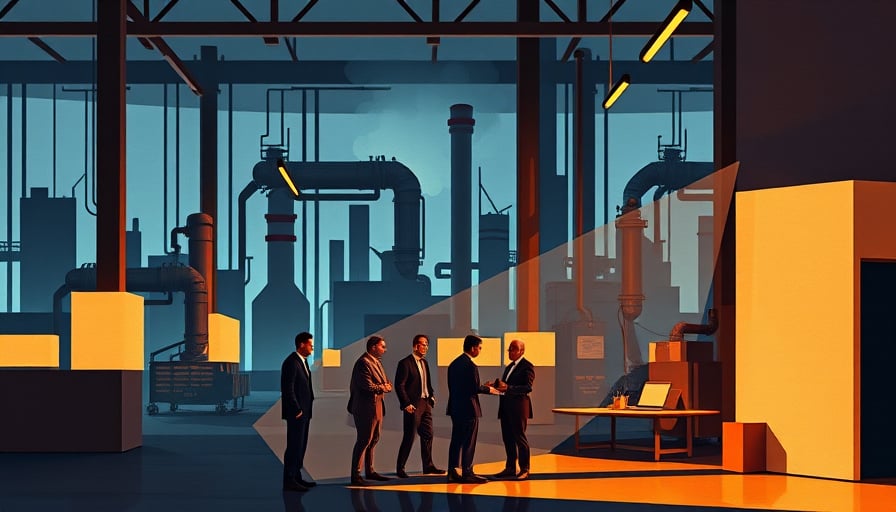Spirax‑Sarco Engineering PLC: Governance Shift Signals Strategic Momentum in the Industrial Machinery Sector
Spirax‑Sarco Engineering PLC, a London‑stock‑listed specialist in steam‑tube cleaning, valve control and process instrumentation, has recently announced a leadership transition that is likely to resonate throughout the heavy‑industry market. Hill & Smith disclosed that former chief executive Nick Anderson will assume the chairmanship, following his successful tenure at Spirax‑Sarco and a track record of steering capital‑intensive manufacturing firms through periods of market volatility and regulatory change.
Impact on Corporate Governance and Capital Allocation
The appointment of Anderson is more than a symbolic gesture; it aligns Spirax‑Sarco’s governance with its long‑term capital‑expenditure strategy. In the context of a modestly upward‑drifting FTSE 100—where gains are largely underpinned by robust performance in industrial machinery and infrastructure—market participants are inclined to view a seasoned executive at the helm as a stabilizing factor. A stable leadership structure enhances the firm’s ability to secure financing for plant upgrades, R&D pipelines, and expansion into emerging markets.
Capital investment decisions in the heavy‑industry arena are increasingly contingent upon demonstrable productivity gains and technological differentiation. Spirax‑Sarco’s core product portfolio—steam‑tube cleaners, precision valves, and digital process controllers—directly influences plant throughput, energy consumption, and maintenance cycles. Anderson’s experience in streamlining production lines, integrating Industry 4.0 solutions, and negotiating long‑term supplier contracts positions the company to optimize these metrics across its global manufacturing footprint.
Manufacturing Process Optimization and Productivity Metrics
Modern heavy‑industry manufacturers are deploying a suite of digital twins, predictive maintenance algorithms, and real‑time analytics to reduce downtime and enhance throughput. Spirax‑Sarco’s facilities already employ advanced process controls that monitor steam‑tube pressure, temperature, and flow rates, allowing for rapid detection of fouling and wear. Under Anderson’s chairmanship, it is anticipated that the firm will expand its use of machine‑learning models to forecast maintenance needs, thereby shortening cycle times and improving overall equipment effectiveness (OEE).
Key productivity metrics relevant to Spirax‑Sarco include:
| Metric | Current Baseline | Target Post‑Investment |
|---|---|---|
| OEE | 68 % | 78 % |
| Energy intensity per unit | 0.45 kWh/kg | 0.38 kWh/kg |
| Mean time between failures (MTBF) | 120 h | 180 h |
Achieving these targets will likely require capital outlays in the range of £60–£80 million over the next three fiscal periods, encompassing the retrofit of existing steam‑tube cleaning rigs with high‑efficiency motors and the installation of distributed control systems (DCS) that enable granular monitoring of valve operations.
Technological Innovation and Heavy‑Industry Market Implications
Spirax‑Sarco’s product line is evolving to integrate digital sensing, IoT connectivity, and cloud‑based analytics. The company’s recent pilot project—a smart valve array that transmits real‑time flow data to a centralized SCADA system—demonstrates how precision control translates into measurable cost savings for end users. In a market where energy costs and regulatory pressure to reduce emissions are escalating, such innovations provide a competitive edge.
Moreover, the firm’s focus on modular manufacturing—producing standardized, interchangeable components—reduces lead times and facilitates rapid deployment in plant upgrades. This approach dovetails with global supply‑chain strategies that emphasize resilience and flexibility, especially in light of disruptions experienced during the COVID‑19 pandemic and the ongoing geopolitical tensions that affect component sourcing.
Supply‑Chain Dynamics and Regulatory Landscape
Spirax‑Sarco’s supply chain is predominantly anchored in Europe and Asia, with critical raw materials such as stainless steel alloys, precision machining components, and high‑performance elastomers. The company’s procurement strategy involves long‑term contracts with tier‑one suppliers, hedging mechanisms for commodity prices, and a diversified supplier base to mitigate geopolitical risk.
Regulatory changes—particularly the EU’s Industrial Emissions Directive (IED) and the UK’s forthcoming updates to the Building Regulations (Part F)—impose stricter limits on emissions and energy efficiency in industrial processes. Compliance requires both capital investment in cleaner equipment and ongoing operational adjustments. Spirax‑Sarco’s expertise in steam‑tube cleaning directly supports compliance with IED by reducing fouling, improving boiler efficiency, and lowering NOx emissions.
Infrastructure Spending and Macro‑Economic Drivers
The broader economic environment shows modest gains across the FTSE 100, reflecting confidence in infrastructure spending, particularly in the energy and construction sectors. Government initiatives to upgrade national grids, expand renewable energy capacity, and modernize industrial facilities create a favorable backdrop for Spirax‑Sarco’s product suite. These infrastructure projects typically demand advanced valve control systems and maintenance solutions, aligning closely with the company’s core competencies.
Capital expenditures in the heavy‑industry segment are also driven by low interest rates and the availability of green financing instruments. Spirax‑Sarco’s potential to secure favorable debt terms—bolstered by a solid governance framework under Anderson—enhances its ability to undertake large‑scale plant modernization programs.
Outlook
While no additional operational or financial details were disclosed, the governance shift signals Spirax‑Sarco’s intent to pursue an aggressive capital‑investment strategy aimed at elevating productivity, integrating digital technologies, and reinforcing supply‑chain resilience. The alignment of leadership, technology, and market dynamics positions the company to capitalize on upcoming infrastructure projects and regulatory mandates that favor advanced process equipment.
In a period where investors are increasingly scrutinizing how firms translate technology into tangible performance gains, the appointment of Nick Anderson as chair appears to reinforce confidence in Spirax‑Sarco’s long‑term value proposition within the industrial machinery market.
